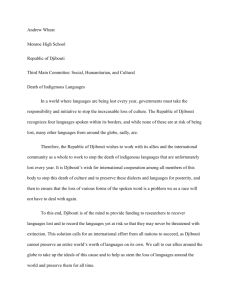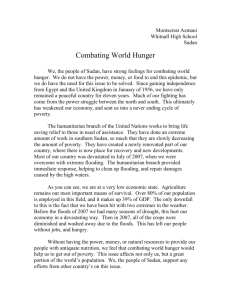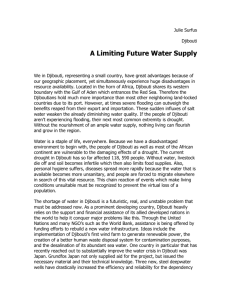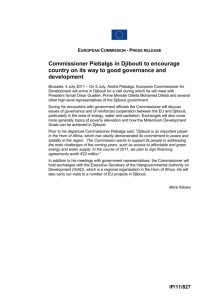Editorial Development of an Oil Spill Contingency Plan for the Sudan
advertisement
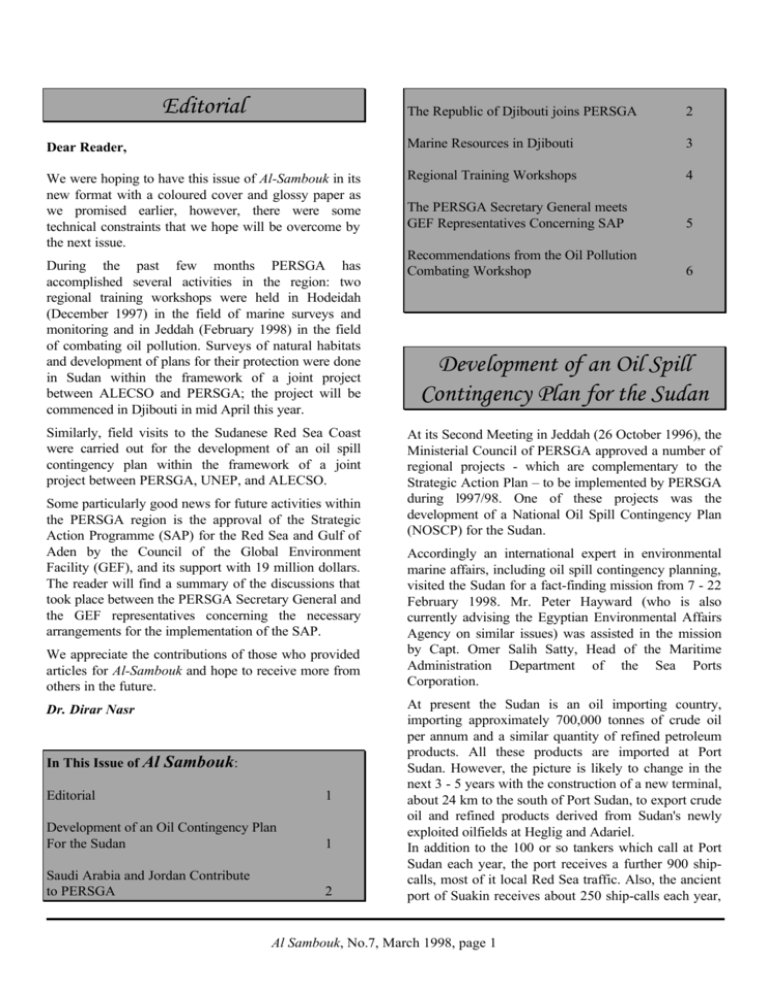
Editorial The Republic of Djibouti joins PERSGA 2 Dear Reader, Marine Resources in Djibouti 3 We were hoping to have this issue of Al-Sambouk in its new format with a coloured cover and glossy paper as we promised earlier, however, there were some technical constraints that we hope will be overcome by the next issue. Regional Training Workshops 4 The PERSGA Secretary General meets GEF Representatives Concerning SAP 5 Recommendations from the Oil Pollution Combating Workshop 6 During the past few months PERSGA has accomplished several activities in the region: two regional training workshops were held in Hodeidah (December 1997) in the field of marine surveys and monitoring and in Jeddah (February 1998) in the field of combating oil pollution. Surveys of natural habitats and development of plans for their protection were done in Sudan within the framework of a joint project between ALECSO and PERSGA; the project will be commenced in Djibouti in mid April this year. Similarly, field visits to the Sudanese Red Sea Coast were carried out for the development of an oil spill contingency plan within the framework of a joint project between PERSGA, UNEP, and ALECSO. Some particularly good news for future activities within the PERSGA region is the approval of the Strategic Action Programme (SAP) for the Red Sea and Gulf of Aden by the Council of the Global Environment Facility (GEF), and its support with 19 million dollars. The reader will find a summary of the discussions that took place between the PERSGA Secretary General and the GEF representatives concerning the necessary arrangements for the implementation of the SAP. We appreciate the contributions of those who provided articles for Al-Sambouk and hope to receive more from others in the future. Dr. Dirar Nasr In This Issue of Al Sambouk: Editorial 1 Development of an Oil Contingency Plan For the Sudan 1 Saudi Arabia and Jordan Contribute to PERSGA 2 Development of an Oil Spill Contingency Plan for the Sudan At its Second Meeting in Jeddah (26 October 1996), the Ministerial Council of PERSGA approved a number of regional projects - which are complementary to the Strategic Action Plan – to be implemented by PERSGA during l997/98. One of these projects was the development of a National Oil Spill Contingency Plan (NOSCP) for the Sudan. Accordingly an international expert in environmental marine affairs, including oil spill contingency planning, visited the Sudan for a fact-finding mission from 7 - 22 February 1998. Mr. Peter Hayward (who is also currently advising the Egyptian Environmental Affairs Agency on similar issues) was assisted in the mission by Capt. Omer Salih Satty, Head of the Maritime Administration Department of the Sea Ports Corporation. At present the Sudan is an oil importing country, importing approximately 700,000 tonnes of crude oil per annum and a similar quantity of refined petroleum products. All these products are imported at Port Sudan. However, the picture is likely to change in the next 3 - 5 years with the construction of a new terminal, about 24 km to the south of Port Sudan, to export crude oil and refined products derived from Sudan's newly exploited oilfields at Heglig and Adariel. In addition to the 100 or so tankers which call at Port Sudan each year, the port receives a further 900 shipcalls, most of it local Red Sea traffic. Also, the ancient port of Suakin receives about 250 ship-calls each year, Al Sambouk, No.7, March 1998, page 1 all of them ro-ro passenger ferries mainly plying the route between Suakin and Jeddah. The pollution "hot spots" are therefore the oil handling activities within the ports (and future terminal), but the coastline is also at risk from the possibility of ship collisions in the anchorage areas or grounding on the fringing coral reefs which border much of the Sudan. It should not be overlooked that about 1.5 million barrels of oil per day passes through the Gulf of Aden, and is joined by a further 1.35 million barrels of oil per day from Yanbu (Saudi Arabia). Together this trade constitutes about 11% of the global seaborne transport of oil. Whilst there are no particular navigational hazards in the Red Sea proper, and the region has been remarkably free from major tanker spills, the potential risk posed by this traffic (including the possibility of operational discharges from ships using the Suez Canal route), and the possible impact on Sudan's coastline, cannot be ignored. The recently established Ministry of Environment and Tourism (1995) is ultimately responsible for all national environmental affairs. However it seems clear that responsibility for the Sudan's NOSCP should rest with the Sea Ports Corporation (SPC), a part of the Ministry of Transport, since the SPC is responsible for the management of the ports and anchorage areas. Furthermore, the SPC is the only agency with the potential to develop an operational sea-going capacity to combat oil pollution through the use of its tugs and other port vessels. The fact-finding mission held discussions with many government and private bodies in the Sudan, all of whom will have a role to play in the national contingency plan and all of whom expressed their willingness to co-operate in this activity. The next step will be a one-day Seminar in April or May l998 to which all the parties will be invited. This seminar will consider the draft contingency plan prepared by the consultants and will determine the best way forward to establish realistic operational responsibilities for an oil spill response within the Sudan. budget of 1997. Such contributions enable PERSGA to implement the projects approved by the PERSGA Council and recommended by the SAP Consultative Meeting as complementary to the latter. Surveys of Natural Habitats and Development of Plans for their Protection, for instance, is a joint project between PERSGA and ALECSO that has been implemented in Sudan and will be implemented in Djibouti next April. The development of a national contingency plan for Sudan is another joint project that has been implemented in Sudan in accordance with the recommendations of the SAP Consultative Meeting. The financial contributions also enabled PERSGA to hold the Regional Training Workshop on Oil Spill Combating in Jeddah. The Republic of Djibouti joins PERSGA PERSGA Secretariat officially received from the Government of the Republic of Djibouti the documents concerning its joining to PERSGA. Mr. Mohammed Ali Mumen, Director of the Environmental Directorate (Ministry of Environment and Tourism) informed PERSGA that the Djibouti Council of Ministers and the Legal Council expressed their concern regarding PERSGA activities in the region especially its coordinating role and its support to national capacity building in the field of conservation of the marine environment. PERSGA Secretariat will take the necessary measures to inform the Saudi Arabian Ministry of Foreign Affairs regarding this matter. Marine Resources in Djibouti 1- Location Saudi Arabia and Jordan Contribute to PERSGA Djibouti, which lies, at the junction of the Red Sea and the Gulf of Aden, has an area of 23,000 km2 and a coastline of about 370 km in length. The northern coast between the Eritrean border and Ras- Bir faces the narrow Strait of Bab al Mandab. PERSGA has received the contributions of the Jordanian and Saudi Arabian Governments to the Most of the coastline of Djibouti lies along the narrow Gulf of Tadjourah, an east-west oriented trench with a maximum depth of 883 m. A shallow, but narrow Al Sambouk, No. 7, March 1998, page 2 opening separates it from the semi-enclosed basin of the Goubet al-Kharab, which has increased salinity and coral reefs of low species diversity. For most of the year, surface salinity is about 36.5 ppt. Maskali Sud. Both are marine protected, areas. Other sites for which text proposing protected status has been drafted include marine areas in Tadjourah, Obock, and Arta regions. The relatively high turbidity generally limits coral growth to the upper 15 to 25 m, although corals have been reported from depths below 35 m. 3- Management of coral reefs At the entrance to the Gulf of Tadjourah, north of the town of Djibouti, a large reef plateau forms the base of the islands of Musha and Maskali, which are surrounded by extensive coral reefs. The south-eastern coast between the capital and Loyada at the Somali border is rather shallow and sandy with several estuaries. This area lies in a zone of upwelling nutrient-rich water where coral reefs are poorly developed. The coral reefs are mostly fringing. The reef edge presents variable width. Morphologically, around Musha and Maskali, the actual coral formations are ended by an active cliff, completely alive, reaching 15 m. Beyond this formation, the reef slope is covered by sand and mud. 2- Marine resources and economics aspects The major economic sectors in the coastal zone revolve around maritime transport and port-related activities. At present, fisheries and tourism play only a limited role, although subsistence fisheries are locally important. Both tourism and fisheries have a significant growth potential. In the past a certain number of European tourists (particularly French) used to visit Djibouti, mainly to dive at the Sawabi islands. However, marine tourism is not well developed and its contribution to the national economy is insignificant. The National Tourism Office offers some 60 huts for rent. The private sector provides transport for tourists. Reefs near the capital area are frequently visited by local tourists, above all members of the expatriate community. There is no monitoring of their activities and pressure on these reef resources is high. Marine protected areas are presently restricted to two Islands: Mush and Maskali. Theses two protected islands are considered as nature reserves but are not under control. There are two protected areas in Djibouti: The Parc Territorial de Musha and the reserve lntegrale de Djibouti is endowed with very impressive landscapes and exceptional marine reef formations which could provide a major source of income for the country through tourism. Despite this potential, very little is being done to conserve the country's biological resources. Information about marine resources is poorly addressed. There are inventories of species which present economic interests, plenty of lists of coral fishes and some punctual investigations on coral reefs. The agency responsible for the protected areas of Musha and Maskali are: 1. The High Institute of Scientific and Technical Studies and Researches, 2. The National Office of Commerce and Tourism. In 1991, The National Committee for the environment was created to develop a national environment policy; this committee wrote the first document on the State of the Environment in Djibouti. 4- Constraints and recommendations Many constraints exist in Djibouti, and as a result a number of areas of information are rather poorly addressed. Of particular concern is the inadequate number and level of local staff in all marine fields. As there is no university, opportunities to receive high-level scientific training are limited. Likewise, linguistic differences make training in neighbouring countries very difficult. Therefore, education and training should be a priority for Djibouti. Another impediment to effective marine research is the lack of co-ordination and collaboration among national institutions. This further reduces the efficiency of the limited staff, and hampers the accessibility of the information. Djibouti has no a centralized library or documentation centre. Each institution stores its own information, and often restricts access. A Central Library should be the priority for Djibouti, and preferably this centre should have relevant bibliographic references, and a database of past and present projects. Al Sambouk, No. 7, March 1998, page 3 Finally, Djibouti suffers from isolation from the others countries in the region. This is primarily due to the linguistic factor, but also due to a lack of information about other countries and the institutions that might have data pertinent to Djibouti's need. As specific recommendations Djibouti has to: 3. Improve education and training in all marine fields, 4. Carry out efforts to co-ordinate marine activities in the country so that duplication of efforts and work is avoided, 5. Encourage collaboration between Djiboutian institutions involved in marine resources activities, 6. Establish a centralised library or documentation centre, 7. Increase involvement of local people in projects related to Marine Resources, 8. Encourage collaboration and exchange information with institutions located in the region. Dr. Nabil Mohamed, Mohammed H. Warsama Life Sciences Department, ISERST – Djibouti. Regional Training Workshops During the past few months the PERSGA Secretariat has held two regional training workshops. The first one was in Hodeidah (6-11 December 1997) on Marine Surveys and Monitoring, in coordination and cooperation with the GEF/Yemen Project, the Environmental Protection Council and the UNDP Regional Office both in Sana’a. The Workshop was held in the building of the GEF/Yemen Project in Hodeidah where 21 specialists participated representing Djibouti (1), Egypt (2), Jordan (2), Saudi Arabia (2), Sudan (1), and Yemen (13). Specialized lectures were presented by 12 experts (from Egypt, Saudi Arabia, Australia, and Yemen) on: ‘surveys of coral reefs, physical parameters, living marine resources and their users, oil pollution and the role of databases in surveys and monitoring’. The Workshop included field visits to the mangrove areas. It was, in general, quite successful as indicated by the course evaluation given by the participants. The second workshop was held in Jeddah (21-25 February 1998) on Oil Pollution Combating, in cooperation and coordination with ALECSO, the Meteorology and Environmental Protection Administration (MEPA) and Saudi ARAMCO. Twenty-two specialists participated in this workshop representing Djibouti (2), Egypt (2), Jordan (2), Saudi Arabia (9), Sudan (3) and Yemen (2) in addition to ALECSO and PERSGA Secretariat representatives. The lectures were presented by ten experts from Egypt, Saudi Arabia, Yemen, Australia, and the United States of America. The Workshop was addressed by the PERSGA Secretary General, Dr. Nizar Tawfiq, and an ALECSO representative Dr. Al-Bahlool Al- Yaqubi. The PERSGA Assistant Coordinator, Dr. Dirar Nasr presented a summary of PERSGA activities during the recent past. Field visits were confined to the Saudi ARAMCO Headquarters in Jeddah where practical use of oil spill combating equipment was displayed. The lectures presented were on: response strategies, the use of dispersants, debris transportation and disposal, shoreline clean-up, navigation risk assessment in the Red Sea and Gulf of Aden, international co-operation for oil spill response in a regional context, compensation for pollution damage and preparation of claims, Regional and International Agreements concerning Oil Pollution. The workshop was very successful from the point of view of its organization, the lectures presented and the field visits. At present the PERSGA Secretariat is planning to organise a regional training workshop on Integrated Coastal Zone Management (ICZM) to be held in Port Sudan during the period 29 June - 2 July 1998. The PERSGA Secretary General meets GEF Representatives Concerning the SAP Following a request from the PERSGA Secretary General, a meeting was held in Cairo on 23 January 1998 between Ms. Inger Anderson (UNDP), Dr. Steven Lintner (World Bank), Dr. Friedhelm Krupp (UNDP Consultant) and Dr. Nizar Tawfiq (PERSGA Secretary General) to discuss the necessary arrangements for the implementation of the Strategic Action Programme for the Red Sea and Gulf of Aden. The following is a summary of the result of the discussion: Al Sambouk, No. 7, March 1998, page 4 1. Management of the Red Sea SAP: PERSGA will be the overall manager of the Red Sea SAP project under the under the leadership of its Secretary General. Under the project, PERSGA will be strengthened with the appointment of a Chief Technical Advisor (CTA). Financially the project will be split into three sections (UNDP, UNEP, and World Bank). However, PERSGA and the recipient countries do not have to deal with three separate types of projects and three separate management systems. Hence it was proposed that the management of the project should be unified. 2. PERSGA SAP Task Force: The PERSGA SAP Task Force will continue to operate under the chairmanship of the Secretary General. The three GEF agencies and the Islamic Development Bank will continue to participate in the Task Force meetings. Other donors, such as the European Commission, will also be invited to the Task Force meetings if they join the Red Sea SAP. 3. SAP Programme Documentation: In order to make this project operational, the internal requirements of each of the three GEF agencies demand that agency-specific project documents are prepared before release of funds. Another meeting will follow to draw up common annexes to each of the three agencyspecific documents. These annexes will outline: 1. Programme Implementation Plan 2. Regional elements 3. Country Programmes for Djibouti, Somalia, Sudan, and Yemen (Egypt, Jordan and Saudi Arabia will participate at the regional level) 4. Regional Components which address navigation issues (World Bank) 5. Integrated Component which addresses Monitoring and Evaluation (UNDP) 6. Integrated Component which addresses Institutional Strengthening (UNEP) 7. Budget and Schedule 4. Financial Management: The financial management followed in UNDP may be taken as an example with emphasis on the fact that annual audits of accounts should be done on an annual basis by an internationally recognised audit company. 5. Schedule of Formulation Process: Both UNDP and the World Bank are now in the process of drafting the internal project documents. This task should be completed by the end of March 1998 followed by the beginning of the process of drafting the more important joint annexes. It is assumed that missions will be required to some of the Red Sea countries and these will be carried out during May and June. It is expected that by July 1998 draft documents will be available for circulation and comments in all the Red Sea countries. By August/September these documents will be mailed back to the GEF Secretariat and the GEF Council members for their final endorsement. It is hoped that the final endorsement will be ready in time for the third meeting of the PERSGA Council of Ministers, which is planned to take place in the first week of November 1998. The PERSGA Secretary General and senior officials from UNDP, UNEP, and the World Bank would then sign the project document. At the occasion, the PERSGA Council members would also sign a declaration or a Memorandum of Understanding in support of the Red SAP. Good press coverage would need to be arranged for this event, in coordination between PERSGA and the three GEF agencies. Full project start-up would then begin by November 1998. Recommendations of the Oil Pollution Combating Workshop The Participants at the Oil Pollution Combating Regional Training Workshop, held in Jeddah from 21-25 February 1998, would like to express their thanks to PERSGA and ALECSO for the organization of the Workshop. In order to improve the arrangements for the prevention of marine pollution in the Red Sea Region and enhance the capabilities for effective response to pollution incidents, the Workshop Participants wish to bring the following recommendations to the attention of the Secretary General of PERSGA: 1. PERSGA should actively develop the proposals for a Memorandum of Understanding on Port State Control in the Red Sea in order to secure better enforcement of the relevant IMO conditions, Al Sambouk, No. 7, March 1998, page 5 especially MARPOL 73/78. To that end, it is proposed that, in the first instance, PERSGA should convene a meeting of port and maritime authorities in the region to consider the implications and prepare an action plan. 2. The implementation of the Protocol Concerning Regional Cooperation in Combating Pollution by Oil and Other Harmful Substances in cases of Emergency and, accordingly, the establishment of the Marine Emergency Mutual Aid Centre (MEMAC) at a suitable location. Graphics by Dr. David Olsen (MEPA). Additional copies can be obtained from PERSGA, PO Box 53662 Jeddah 21583, Saudi Arabia. 3. PERSGA should use its best endeavours to adopt the Sub-regional Oil Pollution Combating Centre in Djibouti, under the umbrella of PERSGA, and adopt a mechanism for contributing to the maintenance costs of the equipment stockpile in Djibouti on an annual basis. 4. PERSGA should help those states in the Red Sea region that need technical assistance, to prepare or update their national contingency plans for oil spills and spills of other hazardous substances. A legal framework for enhancing co-operation in the region and a practical contingency plan, which will address both the regional and sub-regional situation, should be the objective. 5. PERSGA and ALECSO should continue their cooperation especially in the field of organising and financing regional training programmes in the field of oil pollution combating. Training (aimed at different technical levels) could be held at a suitable training institution, such as the Arab Academy for Science, Technology and Maritime Transport at Alexandria. 6. PERSGA should work towards evolving guidelines that could be applied throughout the region, for a uniform method for assessing environmental damage following spills of oil or other harmful substances. Al Sambouk is produced at the PERSGA office by Dr. Dirar Nasr (Editor). Translation by Dr. Dirar Nasr and Mr. Yassin H. Yassin. Al Sambouk, No. 7, March 1998, page 6
